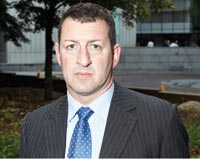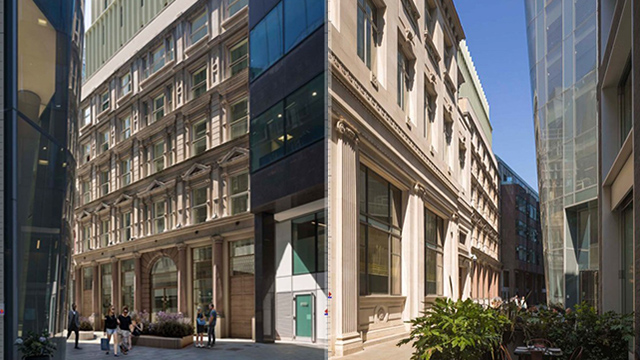On Tuesday the five-year investigation into a £49m mortgage fraud culminated in the imprisonment of chartered surveyor Ian Mark McGarry for seven years.
At the outset of the hearing the prosecution counsel detailed McGarry’s involvement in the fraud which led to him knowingly providing Saghir Afzal and his brother Nisar with false valuations based on fictitious leases.
Andrew Baillie QC explained that those valuations had been used to support fraudulent mortgage applications on six commercial properties. Companies controlled by the Afzals bought the properties from genuine sellers for a total of £5,688,125. This figure represented the true market value of the properties. However, using McGarry’s false valuations the Afzals were able to deceive lenders to loan £49,287,000.
The prosecution went on to describe that the way the fraud worked was similar in each case. A company controlled by the Afzal brothers bought a property, usually an old industrial building in a dilapidated state, from a genuine seller. The property was then bought and sold a number of times over a short period, each time for an apparently higher price. The only money that the Afzals paid out was for the initial purchase. This meant that when the final purchase of each property was completed the Afzals obtained a huge “profit” by virtue of receiving the fraudulent mortgage loans.
Overvaluation of 1,800%
The prosecution stated that in one instance McGarry valued a property at £19m that had been purchased for £1m – an overvaluation of 1,800%. In another instance, McGarry produced three different valuations of the same property, on the same day, for three separate financial institutions.
Baillie went on to detail the bribes paid to McGarry of over £1.2m in money, properties and an Aston Martin car (which he swapped for a Porsche) from the Afzals for his work on the deals along with significant but unquantified monies via brown envelopes given to him in City branches of Starbucks by Nisar Afzal.
The prosecution said that at his first interview following his arrest on 15 March 2006, McGarry denied he was part of a conspiracy to defraud and claimed that he had done the valuations under pressure from introducers of the property deals and his superiors.
£86,000 in cash
Following questioning he was released, but as the prosecution counsel pointed out, he was rearrested two weeks later when he was stopped outside the London City Vaults carrying £86,000 in cash. A search of the building’s toilets uncovered a bent United National Bank card in the name of IM McGarry and a broken CD Rom. On arrest he told officers: “I have been a very silly boy.”
McGarry’s counsel Mohammed Khamisa QC then sought to show the judge that the route towards the dock of Court 5 at Southwark Crown Court began not with his introduction to Nisar and Saghir Afzal, the Birmingham brothers behind the fraud, but on his arrival at Dunlop Heywood in October 1999 – a firm where, his counsel claimed, the way to obtain and retain business was lavish entertaining of clients and reporting best value – an alleged valuation approach that appeared to ignore the less favourable aspects of any given property and reported the most optimistic valuation figure.
His counsel claimed that the high valuation culture worked well, with the borrower receiving the loan on the basis of the valuation and paying the loan back by way of mortgage payments over a period of time – nobody ever lost. McGarry’s counsel alleged that the defendant was instructed to give high valuations by superiors and no one ever complained because nothing ever went wrong.
In April 2001, the merger between Dunlop Heywood and Baker Lorenz changed the company strategy.
McGarry’s counsel claimed that David Kahn as managing director of the new firm Dunlop Heywood Lorenz (which later became Dunlop Haywards) led that change in the strategy of the company, which focused on, among other things, “aggressive marketing and exploitation of every opportunity and cross-selling between departments within the firm. The focus on profit became very much the norm.”
McGarry’s counsel claimed that that merger was followed the next year by the introduction to the firm of Raed Hanna’s finance brokerage Mutual Finance Ltd, which meant that the quality of work became of a far higher calibre. His counsel said that as a result the size of assets on which valuations were conducted went into the stratosphere – from the league of £1m to £5m into the league of anything between £30m and £200m.
McGarry’s counsel claimed that the team at Dunlop Haywards was not really big enough to handle the work and a system of overvaluation gradually developed within the team – and further claimed that McGarry was adamant that the development was employer-led and employer-supported and that those in the know acquiesced with it.
Closed mind
Khamisa told the judge that while the Afzal brothers were conmen who took in a very large number of professional and honest people, including a member of parliament, as part of their fraud, what McGarry did was to “close his mind to the obvious”.
Referring to the bribes, Khamisa said that McGarry had accepted the money “in order to compensate for the shortcomings of the Dunlop Haywards bonus system”.
Khamisa stated that while McGarry conceded that his role was an important one in the fraud, he questioned the conduct of the banks in the transactions. He argued that in reality there “had to be someone with detailed and vast knowledge of the way in which lending institutions worked and what banks take into account in order to push deals through. There had to be a senior employee of a lending institution involved and it would be entirely wrong to ignore the part played by the banks, brokers and other professionals within this fraud.”
Interrupting that submission Judge Martin Beddoe said: “This fraud could not have happened without the complicity of your client providing the valuations he did. The complicity or otherwise of anyone else I can not possibly determine.”
Khamisa continued: “The man who appears at the centre of all this is a banker who worked at Royal Bank of Scotland until 2005 when he was dismissed, Irfan Qadir, who was involved in a large number of these transactions and then went to the Bank of Ireland, where we believe he has been suspended as part of an investigation into his conduct.”
Interrupting Khamisa again, the judge said: “Irfan Qadir did not lend any of the money advanced on these deals; that decision was made by the credit committee of the banks. And from the evidence I heard that committee relied on the propriety of the information given to them by Mr McGarry and the solicitors.”
Dealing with McGarry’s knowledge of the fraud Khamisa said it wasn’t until late 2005 that he discovered that the leases on Tattersett Business Park in Norfolk on which Société Générale had loaned £9.1m to the Afzals were fictitious.
Khamisa said that McGarry became “terrified” but went on to do three further valuations on which Nationwide loaned £6.5m, £14.2m and £6.15m respectively.
Khamisa said that McGarry hoped that the situation would resolve itself and that the money gained from the later transactions would buy sufficient time to remove the problems of the earlier ones. The decision to provide valuations and not go to the authorities was one that McGarry was “hugely ashamed of”, Khamisa told the judge.
Describing his response to police on arrest, Khamisa said that McGarry declined legal representation and answered all questions put to him in interview as he wanted to make a clean breast of what had happened. “It had all been weighing heavily on him for some considerable time,” Khamisa said.
Act of mercy
Sentencing McGarry to seven years “as an act of mercy”, Judge Beddoe gave little weight to McGarry’s protestations that he knew nothing of the fraud.
He said: “I can find no other reason for your involvement in the fraud other than simple and frankly rampant greed. You were seduced into dishonesty because you are prone to dishonesty. You acted in a thoroughly dishonest way not just on one occasion but over more than two years. You were in on the fraud from the start. From the time of the first valuation, you were well in with the Afzals.
“You knew full well what you were doing on the valuations. You betrayed your firm and betrayed those banks and building societies that relied on you. That breach is an aggravating feature of your case,” he said.
Following sentence, McGarry’s solicitor, Anil Rajani from IBB Solicitors, said: “We will be lodging an appeal against this manifestly excessive sentence.”











